What do you think?
Rate this book


226 pages, Hardcover
First published September 6, 2012

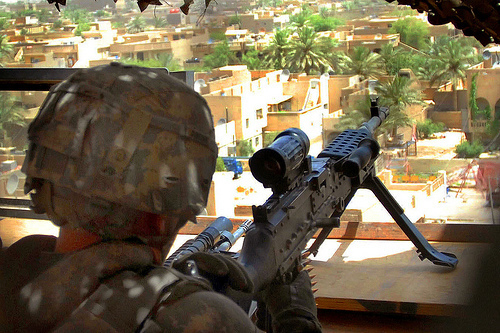
"When the mortars fell, the leaves and fruit and birds were frayed like ends of rope. They lay on the ground in scattered piles, torn feathers and leaves and the rinds of broken fruit intermingling. The sunlight fell absently through the spaces in the treetops, here and there glistening as if on water from smudges of bird blood and citrus."


"I thought about my grandfather's war. How they had destinations and purpose. How the next day we'd march out under a sun hanging low over the plains in the east. We'd go back into a city that had fought this battle yearly,; a slow, bloody parade in fall to mark the change of season. We'd drive them out. We always had. We'd kill them. They'd shoot us and blow off our limbs and run into the hills and wadis, back into the alleys and dusty villages. Then they'd come back, and we'd start over by waving to them as they leaned against lampposts and unfurled green awnings while drinking tea in front of their shops."


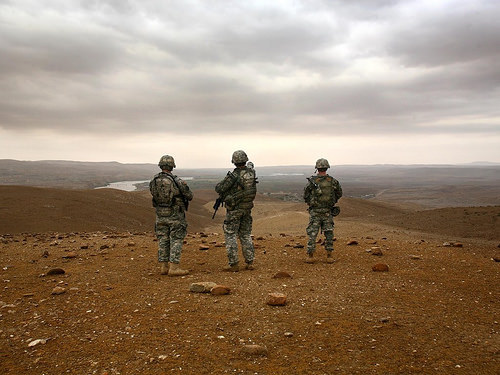
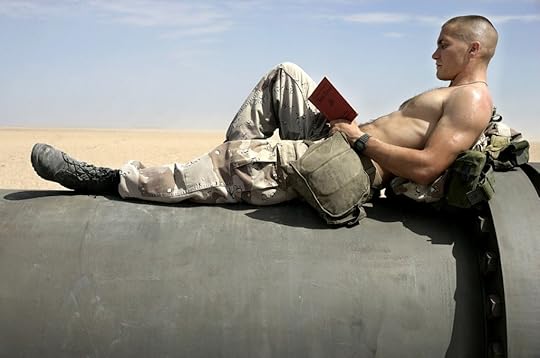



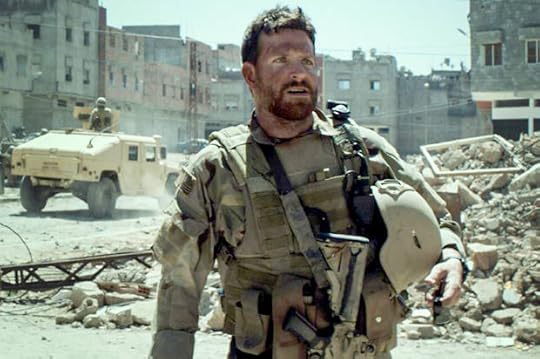
The war tried to kill us in the spring. As grass greened the plains of Nineveh and the weather warmed, we patrolled low-slung hills beyond the cities and towns. We moved over them and through the tall grass on faith, kneading paths into the windswept growth like pioneers. While we slept, the war rubbed its thousand ribs against the ground in prayer.
Then it was spring again in all the spoiled cities of America. The dark thaw of winter fumbled toward its end and passed. I smelled it reeking through my window during that seventh April of the war…
The pilot made an announcement when all the passengers had taken their seats. Said how honored he was to be giving an American hero a ride home. Fuck it, I thought. I got four free Jack and Cokes out of the deal and a little extra legroom…
We walked her past a copse of alder and willow that bowed in the heat of the small fires burning nearby, their old branches lamenting her, laid out as she was on that makeshift litter. Our hands began to cramp with each passing step, each taken with whatever reverence we could muster, clutching at the edges of the boards. Thin splinters roughed the flats of our palms as we walked. Listing in concert with our deliberate footsteps, the gentle curves of her body swayed beneath her torn clothes. The boards creaked. A small number of boys out on a head count stopped and turned toward us. A pale review as her body ascended the gently sloping hill, fringed by the bleached and spotted patterns of their uniforms. We conducted her pall in earnest up the remainder of the hill. At the top, we lowered her to the ground and set her under a tree on the tied-together boards, her body now translucent and blue-tinted. One of the soldiers alerted the medics and we watched them as they came to her. Her friends grabbed her and enveloped her in hugs and kisses. She rolled absently in their loving arms and they cried out beneath the setting sun…The sun set like a clot of blood on the horizon. A small fire had spread from the crumbling chapel, igniting the copse of tamarisk trees. And all the little embers burned like lamps to light my way.

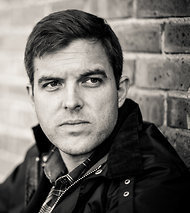



“While we ate, the war fasted, fed by its own deprivation. It made love and gave birth and spread through fire.
Then, in summer, the war tried to kill us as the heat blanched all color from the plains. The sun pressed into our skin, and the war sent its citizens rustling into the shade of white buildings. It cast a white shade on everything, like a veil over our eyes. It tried to kill us every day, but it had not succeeded. Not that our safety was preordained. We were not destined to survive. The fact is, we were not destined at all. The war would take what it could get. It was patient. It didn’t care about objectives, or boundaries, whether you were loved by many or not at all. While I slept that summer, the war came to me in my dreams and showed me its sole purpose: to go on, only to go on. And I knew the war would have its way.”
“War is the great maker of solipsists: how are you going to save my life today? Dying would be one way. If you die, it becomes more likely that I will not. You’re nothing, that’s the secret: a uniform in a sea of numbers, a number in a sea of dust. And we somehow thought those numbers were a sign of our own insignificance. We thought that if we remained ordinary, we would not die. We confused correlation with cause and saw a special significance in the portraits of the dead, arranged neatly next to the number corresponding to their place on the growing list of casualties we read in the newspapers, as indications of an ordered war.”
“It was far too dark to see into it, but the images were there like an etching through the night. The stench of the dead had cut itself free from the odors coming from Al Tafar. The trash fires and sewage, the heavy scent of cured lamb, the river; above all this was the stink of decay from the bodies themselves. A shudder ran through my shoulders, a quick shake, as I hoped not to step into the slick mess of one of them as we marched to the fight.”
“When the mortars fell, the leaves and fruit and birds were frayed like ends of rope. They lay on the ground in scattered piles, torn feathers and leaves and the rinds of broken fruit intermingling. The sunlight fell absently through the spaces in the treetops, here and there glistening as if on water from smudges of bird blood and citrus.”
“Or should I have said that I wanted to die, not in the sense of wanting to throw myself off of that train bridge over there, but more like wanting to be asleep forever because there isn’t any making up for killing women or even watching women get killed, or for that matter killing men and shooting them in the back and shooting them more times than necessary to actually kill then and it was like just trying to kill everything you saw sometimes because it felt like there was acid seeping down into your soul and then your soul is gone and knowing from being taught your whole life that there is no making up for what you are doing, you’re taught that your whole life, but then even your mother is so happy and proud because you lined up your sight posts and made people crumple and they were not getting up ever and yeah they might have been trying to kill you too, so you say, What are you gonna do?, but really it doesn’t matter because by the end you foiled at the one good thing you could have done, the one person you promised would live is dead, and you have seen all things die in more manners than you’d like to recall and for a while the whole thing fucking ravaged your spirit like some deep-down shit, man, that you didn’t even realise you had until only the animals made you sad, the husks of dogs filled with explosives and old arty shells and the fucking guts and everything stinking like metal and burning garbage and you walk around and the smell is deep down into you now and you say, How can metal be so on fire? and Where is all this ******* trash coming from? and even back home you’re getting whiffs of it and then that thing you started to notice slipping away is gone and now it’s becoming inverted, like you have bottomed out in your spirit but yet a deeper hole is being dug because everybody is so fucking happy to see you, the murderer, the ******* accomplice, the at-bare-minimum bearer of some ******* responsibility, and everyone wants to slap you on the back and you start to want to burn the whole goddamn country down, you want to burn every goddamn yellow ribbon in sight, and you can’t explain it but its just, like, Fuck you, but then you signed up to go so it’s all your fault, really, because you went on a purpose, so you are in the end doubly f*****, so why not just find a spot and curl up and die and lets make it as painless as possible because you are a coward and, really, cowardice got you into this mess because you wanted to be a man and people made fun of you and pushed you around in the cafeteria and the hallways in high school because you liked to read books and poems sometimes and they’d call you a fag and really deep down you know you went because you wanted to be a man and that’s never gonna happen now and you’re too much of a coward to be a man and get it over with so why not find a clean, dry place and wait it out with it hurting as little as possible and just wait to go to sleep and not wake up and fu**’em all.”
"The dominoes of moments, lined up symmetrically, then tumbling backward against the hazy and unsure push of cause, showed only that a fall is every objects destiny. It is not enough to say what happened.
Everything happened. Everything fell.”
“I took my woobie out of my pack and covered him. I couldn’t look anymore. Most of us had seen death in many forms: the slick mess after a suicide bomber, headless bodies gathered in a ditch like a collection of broken dolls on a child’s shelf, even our own boys sometimes, bleeding and crying as it became apparent that the sound of a casevac was thirty seconds too far in the distance. But none of us had seen this.”
The colonel cleared his throat and pulled a pair of glasses out of his pocket and rested them on the bridge of his nose. One of the sergeants came over and shined a small flashlight on the colonel’s piece of paper. “Boys,” he began, “you will soon be asked to do great violence in the cause of good.” He paced back and forth and his boot prints in the fine dust were never trampled. Each step was precise and his pacing only served to firm and define the tracks that he originally left. The sergeant with the flashlight paced beside him. “I know I don’t have to tell you what kind of enemy you’ll be up against.” His voice became a blunt staccato as he gained confidence in his capacity to motivate us, a bludgeon that smoothed the weary creases in my brain. “This is the land where Jonah is buried, and where he begged for God’s justice to come.” He continued, “We are that justice. Now, I wish I could tell you that all of us are coming back, but I can’t. Some of you will not come back with us.” I was moved then, but what I recall now most vividly about that speech was the colonel’s pride, his satisfaction with his own directness, his disregard for us as individuals. “If you die, know this: we’ll put you on the first bird to Dover. Your families will have a distinction beyond all others. If those bastards want a fight, we’re going to give them one.” He paused. A look of great sentimentality came over him. “I can’t go with you boys,” he explained with regret, “but I’ll be in contact from the operation center the whole time. Give ‘em hell.”
A yellow bird
With a yellow bill
Was perched upon
My windowsill
I lured him in
With a piece of bread
And then I smashed
His fucking head…
-Traditional U.S. Army Marching Cadence
At the top of the card, in the appropriate boxes, Murph had written the requested information. His name: Murphy, Daniel; his social security number; his rank; his unit. Below that were other boxes, left blank in case the need arose to record an assortment of information with a quick X in ink. There was a box for Killed in Action, for Missing in Action, and for Wounded in Action (either lightly or seriously). There was a box for Captured, and for Detained, and for Died as a Result of Wounds. There were two sets of Yes or No boxes, one each for Body Recovered and Body Identified. There was a space for witness remarks and for the signature of the commanding officer or medical personnel. Murph has placed an X in the box for Body Recovered. “Just in case,” he said when he caught me looking. Both of our cards were signed already.
The war tried to kill us in the spring. As grass greened the plains of Nineveh the weather warmed, we patrolled the low-slung hills beyond the cities and towns.
…
Then, in summer, the war tried to kill us as the heat blanched all color from the plains. The sun pressed into our skin, and the war sent its citizens rustling into the shade of white buildings. It cast a while shade on everything, like a veil over our eyes.
…
The war had killed thousands by September. The bodies lined pocked avenues at irregular intervals.
…
We hardly noticed a change with September came. But I know now that everything that will ever matter in my life began then.
"You want to fall, that's all. You think it can't go on like that. It's as if your life is a perch on the edge of a cliff and going forward seems impossible, not for a lack of will, but a lack of space. The possibility of another day stands in defiance of the laws of physics. And you can't go back. So you want to fall, let go, give up, but you can't. And every breath you take reminds you of that fact. So it goes."Obviously, the last sentence a tribute to the classic war novel, Slaughterhouse Five.